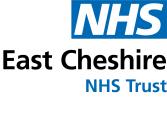The Emergency Department (also known as A&E or casualty) is for major, life-threatening illnesses and injuries and offers access 24 hours a day, 365 days a year. Our Emergency Department is located at Macclesfield District General Hospital.
Apologies due to technical issues information on waiting times is currently unavailable.
You should attend if you have any of the following:
- loss of consciousness
- acute confused state and fits that are not stopping
- chest pain
- breathing difficulties
- severe bleeding that cannot be stopped
- severe allergic reactions
- severe burns or scalds
- stroke
- major trauma such as a road traffic accident
| If you are not sure where to go, call NHS 111 for advice 24 hours a day, 365 days a year. It is free to call from landlines and mobiles. |
Before going to our Emergency Department, think about whether you should visit or could you be seen by a different healthcare professional. The Emergency Department is not an alternative to a GP appointment.
If your GP is closed you can go to 111.nhs.uk or call 111, which will direct you to the best local service.
NHS 111
NHS 111 can help if you have an urgent medical problem and you’re not sure what to do.
Get help online or on the phone
To get help from NHS 111, you can:
- go to 111.nhs.uk (for people aged 5 and over only)
- call 111
NHS 111 is available 24 hours a day, 7 days a week.
How NHS 111 works
You answer questions about your symptoms on the website, or by speaking to a fully trained adviser on the phone.
You can ask for a translator if you need one.
Depending on the situation you will:
- find out what local service can help you
- be connected to a nurse, emergency dentist, pharmacist or GP
- get a face-to-face appointment if you need one
- be told how to get any medicine you need
- get self-care advice
When to call 999
Call 999 in a medical emergency. This is when someone is seriously ill or injured and their life is at risk.
Medical emergencies can include:
- loss of consciousness
- an acute confused state
- fits that are not stopping
- chest pain
- breathing difficulties
- severe bleeding that cannot be stopped
- severe allergic reactions
- severe burns or scalds
Call 999 immediately if you or someone else is having a heart attack or stroke. Every second counts with these conditions.
Also call 999 if you think someone has had a major trauma, such as after a serious road traffic accident, a stabbing, a shooting, a fall from height, or a serious head injury.
For further information on the 999 service please click here
The North West Ambulance Service has provided some useful information and guidance here on when to call 999 and alternatives to calling 999 for less serious medical issues.
Patient Leaflets
Found a problem? Report it and help us to improve our website
